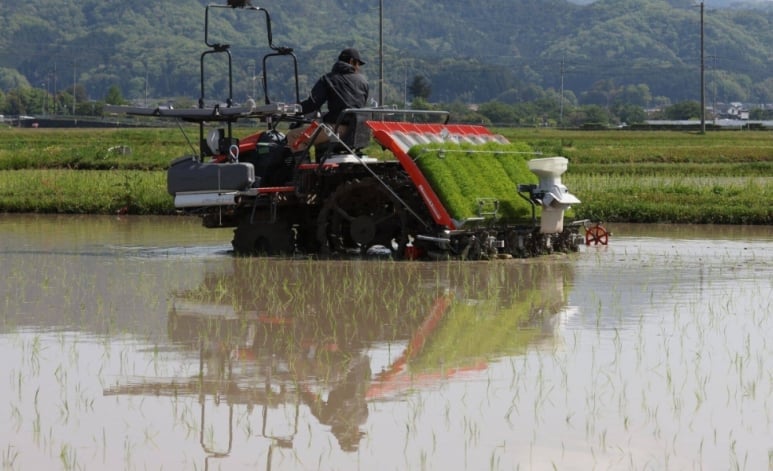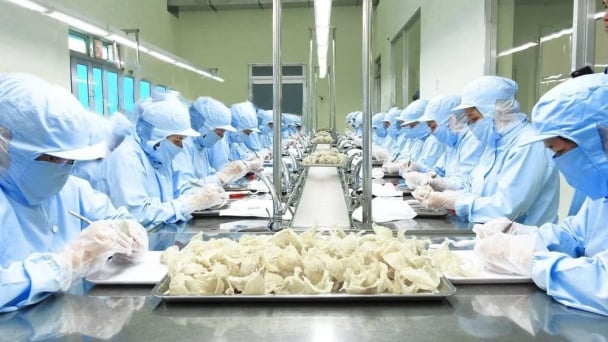May 14, 2025 | 16:32 GMT +7
May 14, 2025 | 16:32 GMT +7
Hotline: 0913.378.918
May 14, 2025 | 16:32 GMT +7
Hotline: 0913.378.918

Despite the government releasing rice from its emergency stockpile since March, prices have remained high. | BLOOMBERG.
The average supermarket price of 5 kilograms of rice dropped last week for the first time since December, falling ¥19 to ¥4,214 in Japan. This amounts to a 0.4% decline from the week starting April 28, the farm ministry announced Monday.
However, the hefty ¥4,000 price tag is still more than double the price from the same period last year.
Angry netizens took to X to express their frustration over the slight drop.
"They said on the TV news that the price of rice dropped, but the amount of the price drop was ¥19. ... You call that a price drop?" one post read.
“We understand that the price of rice blends using stockpiled rice is lower than the average price of rice sold in retail stores, with the cheapest ones being in the mid-¥3,000 price range including tax — we believe this is a result of the increased supply of stockpiled rice to retail stores,” Chief Cabinet Secretary Yoshimasa Hayashi said on Tuesday.
Despite the government releasing rice from its emergency stockpile since March, prices have remained high, partly because of the time it takes distributors to ship the auctioned rice to wholesalers.
Japan's National Federation of Agricultural Cooperative Associations (Zen-Noh) purchased about 200,000 metric tons of stockpiled rice out of the government's supply of 310,000 tons, but as of May 8, only around 63,000 tons—about 32%—had been shipped to wholesalers.
According to Zen-Noh, it plans to distribute around 140,000 tons, or 70%, of its rice supply by the end of July.
The major distributor said they have been delivering an average of 2,000 to 3,000 tons of rice to buyers every day. However, distribution efforts slowed during the first week of May due to the Golden Week holidays.
The government plans to continue releasing rice from its emergency stockpile every month until around the end of July as it considers potentially revising the conditions for the auction.
Currently, bidders are limited to major distributors such as Zen-Noh, and auctions occur under the condition that the government will buy back the same amount of rice from the distributors within the next year.
“We are discussing what can be done in light of the current situation on a daily basis within the ministry,” said Japan's Agricultural Minister Taku Eto on Tuesday. “I will make a firm announcement once a policy has been decided.”
If the auction can be expanded to include more companies, it will likely lead to an increase in distribution channels and help circulate the rice more quickly in the market.
Japantimes

(VAN) U.S. tariffs are not only a 'shock', but also an opportunity for Vietnamese businesses to renew their mindset toward comprehensive development.

(VAN) As Bac Giang lychee enters the harvest season, Minister Do Duc Duy expects that the fruit will contribute greatly to agricultural exports due to standardized production and deep processing.

(VAN) Consumers have shown a preference for free-range eggs, but those farming systems are more vulnerable to biosecurity risks like bird flu.
/2025/05/09/5701-1-184335_301.jpg)
(VAN) Vietnam’s eel exports nearly doubled thanks to a mud-free farming model, opening up new prospects while still facing numerous barriers related to international standards.

(VAN) Minister Do Duc Duy warned that if production is not professionalized and supply chains are not transparent, the U.S. market could become a growth bottleneck.

(VAN) Delegating surveillance responsibilities to local authorities is a cost-saving and efficiency-boosting measure that removes a key bottleneck for enterprises, according to Director General Duong Tat Thang.